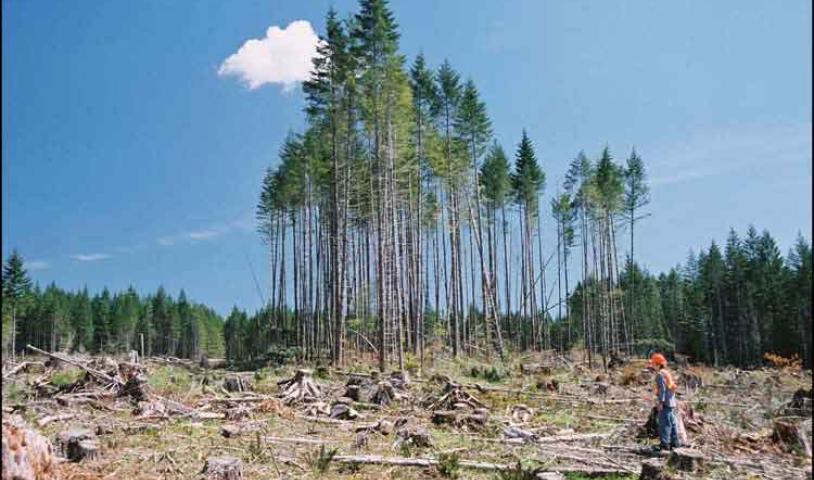Plan for 'guaranteed logging zones' riles environmentalists
Friday, September 25, 2009
Photo: Clearcut with forest reserve
Provincial government and industry want fewer logging restrictions, to compensate for wood lost to pine beetles
The B.C. government was accused Wednesday of using the mountain pine beetle to sidestep hard-won environmental protections.
The province is making plans to establish commercial forest reserves, where intensive logging would make more timber available for sawmills once the beetle-killed logs they are now milling are gone.
Some environmental restrictions could be lifted on those lands, Forests Minister Pat Bell said earlier this week.
Ken Wu of the Western Canada Wilderness Committee said the province's plans would create what he termed "guaranteed logging zones" on portions of Crown forest lands.
It's bound to cause a public outcry if the government moves unilaterally, said Candace Batycki of ForestEthics.
Commercial forest reserves would be logged more heavily -- adding more timber to the province's inventory -- which has been badly depleted by the beetle. Establishing the reserves was a key recommendation in the province's forest roundtable report, tabled earlier this year.
"Pat Bell essentially wants to put in place a major land-use change without a land-use planning process, or any public process," Wu said. "That's a no-go."
The forest industry supports the change and is already seeking access to timber that is currently off-limits to it. Current regulations require companies to leave timber standing to protect public views and also restrict logging adjacent to an existing clearcut until new growth has greened up the harvested patch. The industry is aiming at relaxing these rules.
Bell said earlier this week that the proposed commercial forest reserve could include changes to those regulations. He described the proposed reserves as a tool the government intends to use to reduce the impact of the pine beetle on the mid-term timber supply.
If the government takes no action, the province faces a severe loss of timber for its sawmilling industry that could shut down eight to 12 sawmills.
Bell's initiative won praise from the province's forests workers, who have been thrown out of work by the thousands because of the drop in house construction in the U.S. due to the recession.
"We made those land-use plans with the best intentions but the picture has changed since then with the infestation of the mountain pine beetle. There's a lot of grey timber out there." said Terry Tate, forest worker coordinator for the United Steelworkers Union at Prince George, referring to beetle-killed wood.
"By relaxing the rules, hopefully it will get operations back on an even keel. That will get more people back to work.
"When you've got 8,000 forest workers looking for work [in northern B.C. alone] anything that can be done that's going to assist that will help."
The B.C. Interior can normally sustain a harvest of 50 million cubic metres of wood a year. The annual harvest has been temporarily increased so beetle-killed wood can be salvaged before it deteriorates. But after that wood is gone, forecasts predict the timber supply will fall to about 38 million cubic metres a year -- 24 per-cent below the pre-beetle harvest.
The commercial forest reserve is one of several plans the province wants to implement to reduce the Interior's mid-term timber supply loss from 24 per cent, or 12 million cubic metres of wood, to seven per cent, or 3.5 million cubic metres.
Other plans include developing a bioenergy sector to utilize lower-quality wood. That would make some timber stands commercially viable again after they had been written off because only a few good sawlog trees remained alive.
Bell also intends to bring second-growth stands into production earlier by improving the province's silviculture technology.
Bell said the amount of land to be set aside for commercial forest reserve logging has not been determined. The reserve would be on specific forest lands provincewide. He suggested areas on northern Vancouver Island might be one place where land could be reserved for intensive logging.
"We believe there is a role for a commercial forest reserve. This isn't a large amount of land. It's a relatively small amount of land where we focus on high-value forestry and maximizing the growth off those sites.
"But where there are important public values -- forest recreation values, backcountry tourism values -- we want to protect those as well."
